COVID and my PhD: to lockdown and back
As part of a regular series exploring life as a PhD student, Silvia Ogbeide recounts her experiences of carrying out research into cancer treatments during a global pandemic.
Surviving a PhD during a pandemic.
As part of a regular series exploring life as a PhD student, Silvia Ogbeide recounts her experiences of carrying out research into cancer treatments during a global pandemic.
Hi I'm Silvia, a second-year PhD student in Dr Iain Macaulay’s lab at the Earlham Institute. My PhD aims to exploit single-cell multi-omics techniques – in conjunction with computational tools – to understand the evolution of resistance to chemotherapy.
To achieve this, I perform parallel sequencing of single-cell genomes and transcriptomes on patient-derived organoids established from colorectal (bowel) cancer samples. This Cancer Research UK-funded Accelerator Award aims to produce tools and resources that will bring single-cell multi-omics analyses towards clinical applications.
My BSc degree in Biomedical Science (University of Essex) allowed me to undertake a placement in the Histopathology department at Addenbrooke’s hospital in Cambridge. During this year, I had an insight into what it was like to work in a clinical setting.
I decided to further my studies by doing an MSc in Biomedical Sciences (University of Brighton). After working as a research technician, I was eager to keep learning and decided to look for projects that incorporated the two fields I was most interested in, oncology and molecular biology.
The PhD I’m currently doing stood out the most for its novelty.
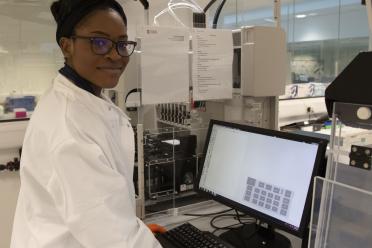
I was only three months into my PhD when the first confirmed case of COVID-19 in the UK was announced. At this point, the World Health Organisation (WHO) had already declared the outbreak a public health concern, so of course, I was shocked! However, I failed to understand the impact that this first case would have on the UK, let alone on the whole world.
I was still oblivious to what was brewing a week later when my friend and I went on a holiday to Spain. I remember the bus journey from the Madrid-Barajas airport as it was yesterday. These two girls were sitting in front of me, and they were wearing masks. I thought to myself: ”Surely the situation hasn’t come to that yet”.
Fast-forward to a month later, back in the UK everyone seemed to know what was about to happen as the virus had spread to several countries, WHO had declared the novel coronavirus a global pandemic and people were stockpiling toilet paper and months’ worth of food supplies.
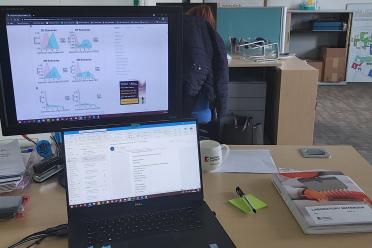
At the institute, we had been advised to take with us whatever we would need to work from home and so, I lumbered home with my monitor, keyboard (and months later) my desk chair. Days later, the PM declared the first lockdown in the UK, ordering people to “stay at home” unless it was to buy essential items, like groceries.
At that point, I was writing a scientific report for my first interim review, so I thought that a few weeks working remotely might be beneficial for me. I was productive while I was writing my report since I had a deadline to meet. But, after submitting it, I no longer felt like I was working towards something; I felt unmotivated without a purpose.
I started to hate my room, as it had also become my office, and I developed an unhealthy obsession with the horrible numbers that marked the alarming spread of the virus.
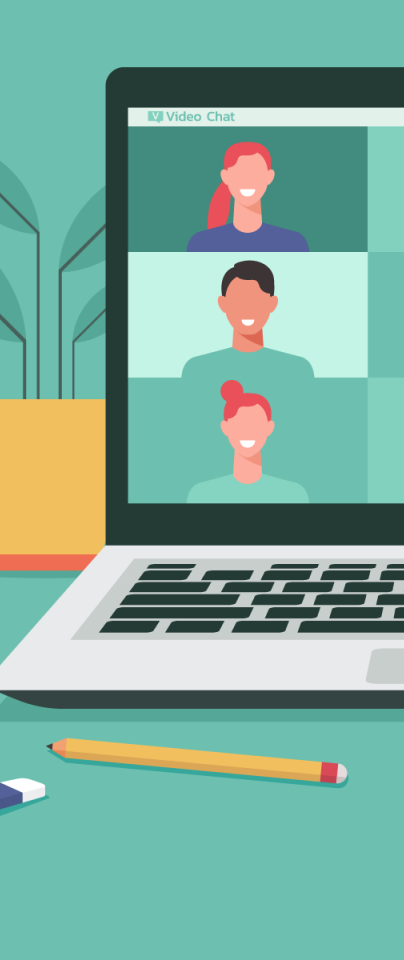

The virtual morning meetings with the members of my team and weekly catchups with my supervisor helped me stay focused on my project goals.

I felt like I was in a movie where a plague turned people into zombies, and I was just waiting for the inevitable to occur to me. To say I was paranoid is an understatement.
Watching those numbers go up daily made it worse, to the point where I started having trouble sleeping. Once I finally recognised the symptoms of anxiety, I decided to take matters into my own hands. I accepted that even if I wished I could change the world’s situation, it was entirely out of my hands. But I could take back control over some aspects of my life.
Firstly, I identified what was triggering my anxiety. I stopped watching the news and deleted all social media apps from my phone. Next, I had to learn how to relax and relieve my stress. For this, meditation was the key.
A positive outcome of the pandemic for me is that I started writing a daily journal. This was initially a positive diary to record one thing that made me smile that day, one thing that I was grateful for and one thing I did well. With time, I felt myself wanting to reflect on my day. Journaling daily has brought many benefits to my life. It’s a great way to record memories and understand the reasons behind the emotions I feel – whether these are positive or negative – about the different things going on in my life.
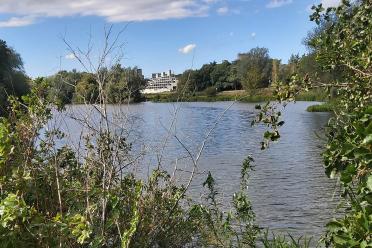
I stayed in touch with my team. The virtual morning meetings with the members of my team and weekly catch ups with my supervisor helped me stay focused on my project goals. Hearing the progress other people were making inspired me to work on my own project. I also tried to keep my social life somewhat active during lockdown by virtually catching up with my friends.
I would consider myself fortunate during lockdown for many reasons. First, because my family and friends were OK. This was more important than any loneliness I could ever feel. Secondly, I was grateful for my fantastic housemates, who became my friends. We would go to see the ponies near the university when we were feeling overwhelmed. We also had many themed dinner nights to the point where I can now admit that I am a great cook!
One of my fondest memories of this pandemic was when I went sampling with one of my housemates, who is doing an environmental-related PhD, and she fell into the river. The river was shallow, so she came out of it mainly covered in mud. We dusted ourselves off and continued sampling!
The excuse of sampling took us to beautiful locations like the beach, where we saw the seals. The virtual social nights with other EI students were also fun to keep in touch with other students.

I accepted that even if I wished I could change the world’s situation, it was entirely out of my hands. But I could take back control over some aspects of my life.

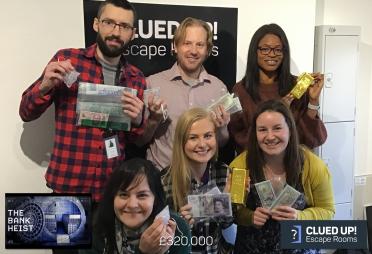
I came to terms with the fact that nobody can be one hundred percent productive when working from home (or even in an actual office). However, I tried to make the most during my productive hours.
I highly recommend playing 417 Hz Solfeggio frequency music in the background for its calming and soothing effects. This has helped me create what is known as a “mindful home workspace” where I can focus, feel less stressed and be productive.
Despite having cracked effective ways of working remotely, I was very much looking forward to returning to the lab when the government started to ease up the restrictions. I needed a change of scenery and I also wanted to see my co-workers, even if we had to be two metres apart. Now, I enjoy the flexibility that comes with working from home.
I believe that I am better at managing my time as I have more control over my schedule. In addition, working from home has not irreparably affected the way I learn. I’ve been able to catch up on delayed experiments and join conferences that moved to virtual platforms. I know that my supervisors will continue to support me while I climb the PhD mountain.
The last year has been like no other, but it wasn’t all that bad for me, and for that, I consider myself lucky. I’m also appreciative of what I took for granted before COVID-19. Many things have changed in the past sixteen months, and I’m hoping that the many changes we’ve undergone have caused us to reflect on our lives and count our blessings, but mainly, move forward.
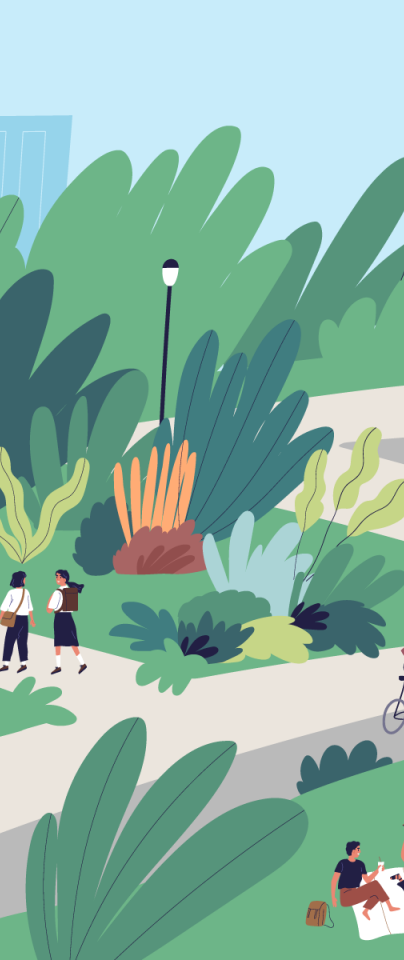

Many things have changed in the past sixteen months, and I’m hoping that the changes we’ve undergone have caused us to reflect on our lives and count our blessings, but mainly, move forward.

When I work from home, I usually start the day by having breakfast while watching something funny like “The Office US”. Once I play my 417 Hz playlist, my mind knows it is time to work. I usually have lunch between 1-2 pm and stop working by 5 pm. Then, it’s time to play! I get my Nintendo Switch and play for a good hour before I start making dinner. I have never watched “Game of Thrones”, so my housemates strongly insisted that I should. We’ve been watching it every evening while they observe my reactions.
My day may be a bit different if I have to perform experiments in the lab. Depending on the length of the experiment, I will either spend the day at the institute or go to the lab and then continue the rest of the work from home.
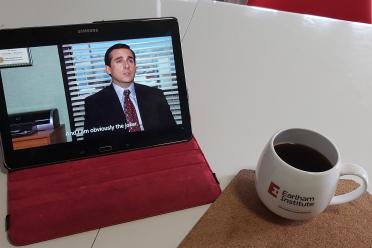
Pick a PhD that speaks to you - ask about training and development opportunities, as well as student life
‣ Learn to accept that failure is a key part of making progress during a PhD. Things rarely work as expected the first time
‣ Create schedules for your work and use them to help you switch off fully from work in the evenings and on weekends
‣ Build a playlist of your favourite music to help your mind focus on the tasks at hand
‣ Make use of flexible working to base yourself where you can be most effective
‣ Keep a journal and use it to record things you’re proud of - reading it back can help you realise how much you’ve achieved
‣ Make use of the full range of opportunities available - building transferable skills, public engagement, student social life, clubs and activities
If you're interested in undertaking a PhD, keep an eye out in the Autumn for our next round of PhD recruitment opportunities.